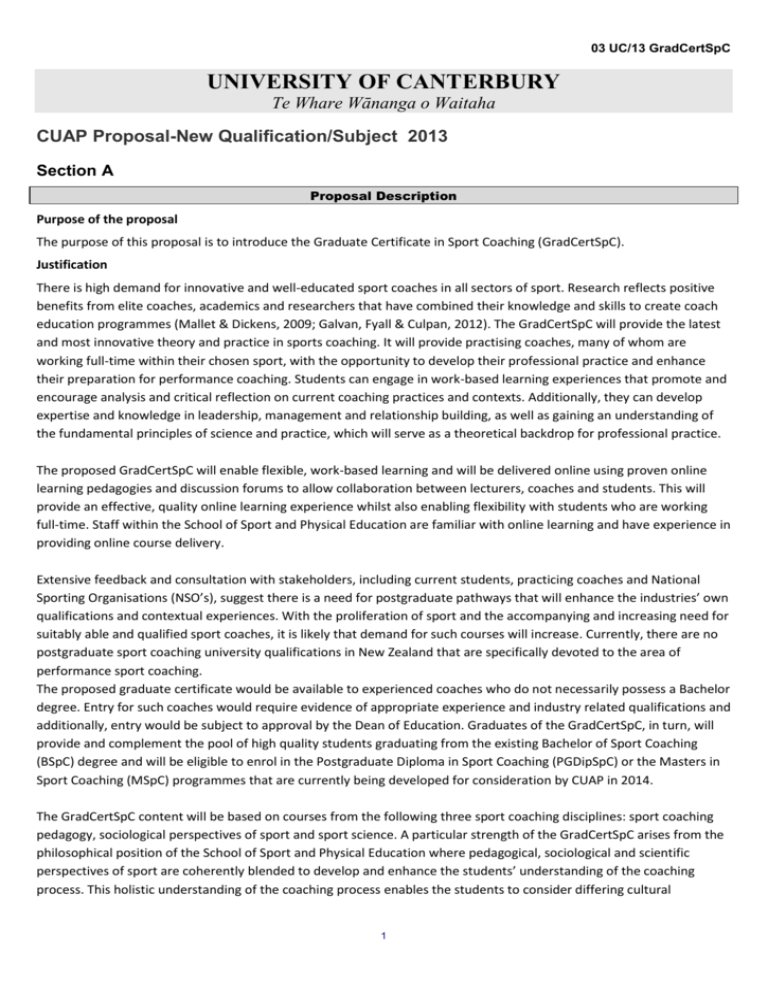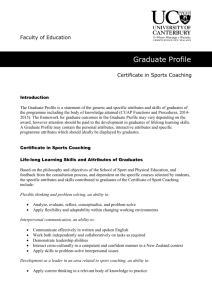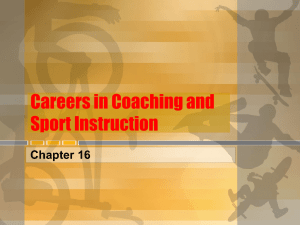Graduate Certificate in Sports Coaching (GradCertSpC)
advertisement

03 UC/13 GradCertSpC UNIVERSITY OF CANTERBURY Te Whare Wānanga o Waitaha CUAP Proposal-New Qualification/Subject 2013 Section A Proposal Description Purpose of the proposal The purpose of this proposal is to introduce the Graduate Certificate in Sport Coaching (GradCertSpC). Justification There is high demand for innovative and well-educated sport coaches in all sectors of sport. Research reflects positive benefits from elite coaches, academics and researchers that have combined their knowledge and skills to create coach education programmes (Mallet & Dickens, 2009; Galvan, Fyall & Culpan, 2012). The GradCertSpC will provide the latest and most innovative theory and practice in sports coaching. It will provide practising coaches, many of whom are working full-time within their chosen sport, with the opportunity to develop their professional practice and enhance their preparation for performance coaching. Students can engage in work-based learning experiences that promote and encourage analysis and critical reflection on current coaching practices and contexts. Additionally, they can develop expertise and knowledge in leadership, management and relationship building, as well as gaining an understanding of the fundamental principles of science and practice, which will serve as a theoretical backdrop for professional practice. The proposed GradCertSpC will enable flexible, work-based learning and will be delivered online using proven online learning pedagogies and discussion forums to allow collaboration between lecturers, coaches and students. This will provide an effective, quality online learning experience whilst also enabling flexibility with students who are working full-time. Staff within the School of Sport and Physical Education are familiar with online learning and have experience in providing online course delivery. Extensive feedback and consultation with stakeholders, including current students, practicing coaches and National Sporting Organisations (NSO’s), suggest there is a need for postgraduate pathways that will enhance the industries’ own qualifications and contextual experiences. With the proliferation of sport and the accompanying and increasing need for suitably able and qualified sport coaches, it is likely that demand for such courses will increase. Currently, there are no postgraduate sport coaching university qualifications in New Zealand that are specifically devoted to the area of performance sport coaching. The proposed graduate certificate would be available to experienced coaches who do not necessarily possess a Bachelor degree. Entry for such coaches would require evidence of appropriate experience and industry related qualifications and additionally, entry would be subject to approval by the Dean of Education. Graduates of the GradCertSpC, in turn, will provide and complement the pool of high quality students graduating from the existing Bachelor of Sport Coaching (BSpC) degree and will be eligible to enrol in the Postgraduate Diploma in Sport Coaching (PGDipSpC) or the Masters in Sport Coaching (MSpC) programmes that are currently being developed for consideration by CUAP in 2014. The GradCertSpC content will be based on courses from the following three sport coaching disciplines: sport coaching pedagogy, sociological perspectives of sport and sport science. A particular strength of the GradCertSpC arises from the philosophical position of the School of Sport and Physical Education where pedagogical, sociological and scientific perspectives of sport are coherently blended to develop and enhance the students’ understanding of the coaching process. This holistic understanding of the coaching process enables the students to consider differing cultural 1 03 UC/13 GradCertSpC interpretations and meanings of sport and the role that they, as sport coaches, play in fulfilling their cultural obligations. This has a strong resonance with Māori and Pasifika communities. The GradCertSpC will meet the needs of communities and organisations in the Christchurch region and through online learning more broadly throughout New Zealand and overseas. The GradCertSpC will enhance the career prospects of students and strengthen the pool of applicants for the proposed PGDipSpC and MSpC which are envisaged to be available from 2015. References Galvan, H., Fyall, G., & Culpan, I. (2012) High performance cricket coaches’ perceptions of an educationally informed coach education programme, Asia-Pacific Journal of Health, Sport & Physical Education, 3 (2), 123-140. Mallet, C., & Dickens, S. (2009). Authenticity in formal coach education: Online postgraduate studies in sport coaching at The University of Queensland. International Journal of Coaching Science, 3 (2), 79-90. Acceptability The new Graduate Certificate in Sport Coaching has been developed in conjunction with internal and external stakeholders to maximise its acceptability regionally, nationally and internationally. The proposal was developed by a working group of six staff within the School of Sport and Physical Education and then presented to the School staff for approval, revision and refining. At all stages the working group have worked in close consultation with AQuA staff, the Dean of Education and the College of Education Academic Manager. Consultation within the University of Canterbury has included College of Education Teaching and Learning Committee, University of Canterbury Students Association, UC Library Services, UC Information and Communication Technology Services, current BSpC students, academic colleagues within the Education Faculty, Staff within the UC Recreation Centre and all Heads of School within the College of Education. External consultation has been conducted with leaders in the coaching field including Sir Graham Henry and Leigh Gibbs, organisations including Sport New Zealand, Sport Canterbury, the International Rugby Board, New Zealand Rugby Football Union, Canterbury Judo, Canterbury Netball and potential students. Responses from all groups have been very positive and supportive, suggesting that the proposal is innovative and in line with best practice in the field. Andrew Eade, the coaching advisor for Sport New Zealand was excited by the proposal as they frequently get requests for scholarships for postgraduate coaching education and saw that the programme would fill a need for coaching development in New Zealand. An advisory group comprising Sir Graham Henry (Rugby), Leigh Gibbs (Netball), and Andrew Eade (Sport New Zealand) has been formed to advise the teaching team over the initial periods of introduction of the course. (Details of consultation are available in section B.) Goals of the programme The proposed Graduate Certificate in Sport Coaching will enable students to graduate with a greater depth of knowledge in Performance Sport Coaching. Consultation with the sport industry suggests that the courses developed will complement and enhance the knowledge that students gain in their current work environments. Another major goal of the programme is to develop and produce quality graduates that are capable of enrolling in, and completing, postgraduate studies in sport coaching. Graduate profile Based on the philosophy and objectives of the School of Sport and Physical Education, and feedback from the consultation process, the specific attributes and skills expected of graduates from the Graduate Certificate in Sport Coaching are: Critical Thinking and Problem Solving, ability to: • Initiate and innovate 2 03 UC/13 GradCertSpC • Analyse, evaluate, reflect, conceptualise and problem-solve • Critically evaluate research and current best practice • Apply flexibility and adaptability to within changing working environments Interpersonal Communication, ability to: • Communicate effectively in written and spoken English • Work both independently and collaboratively on tasks as required • Provide quality leadership • Interact cross-culturally in a competent and confident manner in a New Zealand context • Apply skills to problem solve interpersonal issues Development as a Professional, ability to: • Extend current thinking in a relevant body of knowledge and apply this in practice • Analyse and evaluate own performance and take responsibility for ensuring quality outcomes • Plan for, and organise, continued professional development • To maintain a commitment to lifelong learning and development • Conceptualize the ethical issues and manage them in accordance with professional ethics • Work within and help develop administrative policies and procedures with professional integrity • Work effectively within a multi-cultural environment The GradCertSpc will enable graduates to develop specific knowledge in the sociological, pedagogical and scientific considerations of performance sport coaching. The two compulsory courses will specifically enable graduates will understand and utilize a range of sociological perspectives to evaluate contemporary sport coaching contexts and approaches. Furthermore, graduates will gain an understanding and application of a range of pedagogical sport coaching approaches and critically evaluate these. The Practicum will enable students to apply and critically evaluate the course content and their own coaching practice in their own workplace or coaching environments. The optional courses will enable graduates to focus and enhance their specialist knowledge in either coaching pedagogy, sociological perspectives of sport coaching or sport science. Additionally graduates will develop an array of valued workplace skills and be able to; • Initiate and innovate • Conceptualize and analyse philosophical issues • Analyse, evaluate, reflect, conceptualise and problem-solve in contemporary sporting contexts • Critically evaluate research and current best practice • Extend current thinking in a relevant body of knowledge and apply this in practice • Analyse and evaluate own performance and take responsibility for ensuring quality performance outcomes. Outcome statement The Graduate Certificate in Sport Coaching (GradCertSpC) provides a programme through which graduates can complement and enhance their work-based skills or, if they are not currently employed in the industry, develop skills and competencies to gain employment in the area of performance sport coaching and related fields. The GradCertSpC will enable graduates to develop specialist knowledge in sociological and pedagogical considerations in performance sport and also allow them to specialise in areas of strength and conditioning, performance analysis, nutrition and recovery, rehab and conditioning, sport sociology, athlete disabilities, leadership and planning or sport psychology. The practicum will enable students to apply their learning and knowledge in their own work or sport coaching settings or areas of sporting interest. Graduates will gain, or further develop, the confidence to challenge current practice and participate in the development of new and innovative best practice. Graduates will be equipped for postgraduate study in sport coaching and sport and exercise science, and for employment within the field of performance sport. In a sporting context graduates will be able to access higher levels 3 03 UC/13 GradCertSpC within organisations, becoming professional head and assistant coaches, specialists in performance analysis and athlete conditioning, leaders in sport development roles, and chief executive officers (CEOs) within sports organisations. Programme overview The Graduate Certificate in Sport Coaching (GradCertSpC) comprises four 15-point courses totalling 60 points, of which at least 45 points are at level 7 (300 level). The GradCertSpC reflects the philosophical position of the School of Sport and Physical Education where sport coaching is constructed through a coherent blend of the socio-cultural, pedagogical and sport and exercise science perspectives. Students complete the following compulsory courses: SPCO371 Contemporary Issues and Pedagogies for Performance Sport Coaching; SPCO370 Performance Sport Coaching Practicum. Additionally, students will select 30 points (two 15-point courses) from the following optional course schedule: SPCO372 Leadership and Planning for Performance Sport Coaching; SPCO331 Performance Analysis 2: Tools and Techniques; SPCO341 Strength and Conditioning for Sport Performance; SPCO342 Rehabilitation and Reconditioning; SPCO343 Nutrition and Recovery for Sport Performance; SPCO305 Sociology of Sport; SPCO308 Athletes with Disabilities; SPCO223 Sport Psychology 2. There is potential to consider increasing the number of optional courses offered over ensuing years, however this will be dependent on the capacity to offer courses online. Proposed teaching/delivery methods The proposed Graduate Certificate in Sport Coaching will enable flexible, work-based learning and will be delivered online using proven online learning pedagogies and discussion forums to allow collaboration between lecturers, coaches and students. This will provide an effective, quality online learning experience whilst also enabling flexibility with students who are working full-time. Staff within the School of Sport and Physical Education are experienced in facilitating online learning and have experience in providing successful online course delivery. Assessment procedures Assessment procedures will include a combination of: Individual tests and exams, Projects, Online presentations, literature reviews, Practicum portfolio and Digital media and video analysis. Resources As this programme will be delivered entirely online, the programme will require the following resources: Programme management (0.3 FTE) Lecture staff and associated workload hours(combination of current Faculty and external professional contractors) IT equipment (Software to support course content). A member of staff from the School of Sport and Physical Education will be seconded to work in conjunction with staff from the Electronic Learning Media group within IT. This person will lead the development and work with other staff from the School of Sport and Physical Education to ensure the face-to-face and distance occurrences of all courses are of the highest quality. Library services and content: in consultation with the university library management, additional library resources including text books and subscriptions to new journals may be required for the programme. Plans for monitoring programme quality A programme monitoring committee will be formed and will comprise three staff from the School of Sport and Physical Education and will also seek to include the student experience manager and the academic manager from the College of Education. The programme monitoring committee will review the content of the programme on a regular basis. An advisory group including Sir Graham Henry, Leigh Gibbs, Andrew Eade (Sport NZ - Coach Development) has been set up and will advise the programme monitoring group around programme content, on a regular basis. Pre and post course meetings will be held with all teaching staff and chaired by the Head of School. Student evaluations will be mandatory for all courses and administered through the Centre for Evaluation and Monitoring at the University of Canterbury. The 4 03 UC/13 GradCertSpC Graduate Certificate will be added to the Programme Review Schedule and a Graduating Year Review will be undertaken at the appropriate time. Confirmation that Section B has been prepared and is available to CUAP on request Section B has been completed and is available on request. For New Qualifications – TEC/NZQA/NZVCC Requirements EFTS value of qualification: 0.5 EFTS NZSCED code: 092103 NZQA exit level of qualification to go on the New Zealand Qualifications Framework: Level 7 Statement regarding funding: N/A Memorandum of understanding: N/A Duration of the Qualification Minimum number of points to complete the qualification: 60 points Vacation/recess weeks: Will depend on start dates as anytime start will be available otherwise as per usual scheduled University vacation/recess weeks Work experience/placement hours per week: Minimum 3 hours per week (SPCO370 Performance Sport Coaching Practicum) Tuition/teaching (full-time equivalent) weeks (including exam and study weeks): 12 weeks (1 semester full-time or part-time equivalent) Teaching hours per week: 144 – 192 hours (36 – 48 hours per course) 3-4 hours per week Self-directed learning hours per week: 1 hour of taught time = 3 hours self-directed Calendar Form New Qualification Regulations UC Calendar 2013 Page 135 Graduate Certificate in Sports Coaching (GradCertSpC) The Programme for this Degree 1. The Structure of the Programme (a) To qualify for the Graduate Certificate in Sport Coaching a candidate must pass courses from the Schedule having a total value of at least 60 points, at least 45 points of which must be at 300 level or above. 2. Duration of the Qualification (a) The usual period of enrolment for a full-time candidate is 6 months. (b) The maximum period for satisfying the requirements for completion of the GradCertSpC is three years. This period refers to the lapsed calendar years, starting from the year in which credit was first achieved in the programme. (c) On application to the Dean of Education, a candidate may be granted an extension of the maximum period for completion where it has been determined that the candidate has an expectation of completing the qualification within a reasonable time period. The period of extension will be specified in each case and the candidate may be required to undertake additional work to comply with current course requirements. 3. Admission to the programme Standard of Entry and Approval Required for Admission to the Programme To qualify for enrolment in the GradCertSpC a student must; (a) hold an approved NZ bachelors degree or equivalent; or 5 03 UC/13 GradCertSpC (b) satisfy the Dean of Education that, based on the student’s post-secondary study and work experience, the student is suitably qualified for admission. Examples of appropriate post-secondary study from a coaching environment would include NZRU Advanced Coaching Course Certificate, NZ Football Senior Level 2 Coaching Certificate or Advanced Youth Coaching Certificate. Notes: 1. Approval of entry, for students who do not hold an approved bachelors degree, will be based on post-secondary study and work experience. This would be likely to include a minimum of five years of sport-related work experience and accompanying industry qualifications. Approval for course entry in this instance would be determined by a selection Committee from the School of Sport and Physical Education. To qualify for enrolment in the GradCertSpC a student must: (a) hold an approved bachelor’s degree; or (b) (i) have at least 5 years’ employment (or coaching) experience deemed relevant to this programme by the Dean of Education or representative; and (ii) provided evidence of appropriate industry (coaching) qualifications (see note (i) below) as deemed relevant to this programme by the Dean of Education or representative; and (c) satisfy the Dean of Education (see note (ii) below) that, based on post-secondary study and work experience, the student is suitably qualified for admission. Notes: (i) Examples of appropriate industry/sport coaching qualifications are; NZRU advanced coaching course certificate, NZ Football senior level 2 coaching certificate or advanced youth coaching certificate. (ii) Approval for course entry will be determined by a selection committee from the UC, School of Sport & Physical Education in consultation with the Dean of Education Schedule to the Regulations for the Graduate Certificate in Sport Coaching For full course information, go to www.canterbury.ac.nz/courses Compulsory Courses: Students will complete the following two 15-point courses (30 points): Course Code Course Title Points EFTS P/C/R/RP/EQ SPCO371 Contemporary Issues and Pedagogies for Performance Sport Coaching Performance Sport Coaching Practicum 15 0.125 15 0.125 With approval from Programme Coordinator With approval from Programme Coordinator SPCO370 Options Additionally, students will select at least two 15-point courses (30 points) from the following optional course schedule: Course Code Course Title EFTS P/C/R/RP/EQ SPCO223 Sport Psychology 2 15 0.125 Sociology of Sports Coaching 15 0.125 SPCO308 Athletes with Disabilities 15 0.125 SPCO331 Performance Analysis 2: Tools and Techniques 15 0.125 SPCO341 Strength and Conditioning for Sport Performance 15 0.125 SPCO342 Rehabilitation and Reconditioning 15 0.125 SPCO343 Nutrition and Recovery for Sport Performance 15 0.125 SPCO 103 or with approval from Programme Coordinator SPCO 207 & SPCO 208 or with approval from Programme Coordinator SPCO 202 or with approval from Programme Coordinator SPCO 231 or with approval from Programme Coordinator SPCO 241 or with approval from Programme Coordinator SPCO 241 or with approval from Programme Coordinator SPCO 242 or with approval from Programme Coordinator SPCO305 6 03 UC/13 GradCertSpC SPCO372 Leadership and Planning for Performance Sport Coaching 15 0.125 With approval from Programme Coordinator Prescription entry. SPCO 331 Performance Analysis 2: Tools and Techniques 15 Points 0.1250 EFTS Not offered in 2014 This course equips student to analyse skilled performance in both a team and individual setting using a range of equipment and methodologies. Successful students will be able to carry out tests from the setup through to data taking and offline analysis in both lab environments and in the field. Students will learn to handle large data sets using both Excel features such as pivot tables, and Access databases, and to carry out analysis of data from single and repeated tests. SPCO 332 Applied Performance Analysis 15 Points 0.1250 EFTS Not offered in 2014 This course further develops the practical and theoretical skills of performance analysis learned in previous related courses. Students will learn about psychological and physiological aspects of performance analysis. Modelling of performance, probability and performance forecasting techniques will be introduced and critically analysed. In addition, this course introduces the student to variations of performance analysis tools used in specific NZ sporting contexts. SPCO 341 Strength and Conditioning for Sports Performance 15 Points 0.1250 EFTS Not offered in 2014 This course provides students with an introduction to the software and technologies used by high performance sports teams. Students will gain experience implementing innovative training methodologies, and learn to organise and concisely report large sets of training and testing data. Furthermore they will develop practical skills working in a team environment and will learn to prioritise training objectives within a short-term training plan. SPCO 342 Rehabilitation and Reconditioning 15 Points 0.1250 EFTS Not offered in 2014 This course provides students with an understanding and appreciation of the psychological, nutritional, physiological and medical issues around injury recovery. Students will gain an appreciation of the different support staff involved in planning a recovery plan and the interaction of their responsibilities as the athlete enters into the reconditioning phase. Students will gain experience planning and practice implementing a recovery plan. Additionally, they will experience using modern recovery techniques. SPCO 343 Nutrition and Recovery for Sports Performance 15 Points 0.1250 EFTS Not offered in 2014 This course challenges students to critically assess various contemporary nutritional and recovery techniques and delve into the research to determine their effectiveness. Students will look at the multidisciplinary relationship between the sports nutritionist and the strength and conditioning coach. Additionally, students will gain an appreciation of when it is appropriate to recommend a particular supplement / recovery intervention. SPCO 370 Performance Sport Coaching Practicum 15 Points 0.1250 EFTS Not offered in 2014 This course provides an application of sport coaching theory to practice. Students will plan, implement, reflect and critically evaluate their own coaching. Students will coach at the performance level of sport with a team or individual(s) over the course of a season, games or events. This course will complement SPCO371 Contemporary Issues and Pedagogies for Performance Sport Coaching. SPCO 371 Contemporary Issues and Pedagogies for Performance Sport Coaching 15 Points 0.1250 EFTS This course will enable students to examine and critique historical and contemporary sport coaching discourse in both team and individual settings using a variety of methodologies. Students will also examine and evaluate current research trends in sport coaching pedagogy and be able to demonstrate an understanding of this within their current coaching practice. This course will complement SPCO370 Performance Sport Coaching Practicum. SPCO371-14S1 (D) Semester 1 SPCO371-14S2 (D) Semester 2 SPCO 372 Leadership and Planning for Performance Sport Coaching 7 03 UC/13 GradCertSpC 15 Points 0.1250 EFTS This course provides an application of sport coaching theory to practice. Students will examine considerations to planning in the performance environment and develop an appropriate yearly plan. They will also analyse relative leadership approaches and its interrelatedness to power and culture SPCO372-14S1 (D) Semester 1 SPCO372-14S2 (D) Semester 2 8







